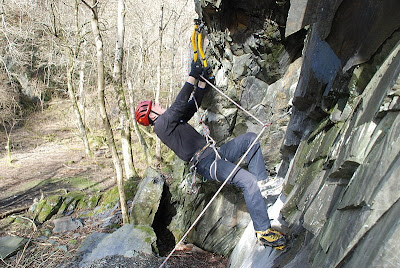The photos below show some training methods that we currently use.

1 Running

2 Hillwalking

3 Bachar ladder

5 Steep bouldering on big holds

6 Indoor drytooling

8 Drytooling on lead

9 Drytooling on top rope
Back to Stuart's Honours project thesis. The chapters of his thesis are likely to be: 1) Introduction to Scottish mixed winter climbing (history, style, North America & Europe versus Scotland, grading system, aims of the study). 2) Methods (systematic literature review, qualitative research, rating of the quality of evidence; identification of research needs) 3) Development of the conditioning programme (needs analysis, identification of training methods and interventions, production of an example of a training programme) 4) Discussion 5) References The first step is the development of a needs analysis from an anatomic (what muscles and organ systems need to be trained?), physiological/metabolic (what are the strength/metabolic requirements?). Ideally this should be based on sound scientific evidence but it is likely that much of this relies on subjective opinions. The second step is to produce a toolbox of training methods and other interventions that can be used to modify the factors identified in a needs analysis. For general training methods there is an abundance of descriptive and mechanistic scientific evidence but there will again be mostly subjective opinion when it comes to training methods. All these training methods may well be good but that is not proven. The final bit is to use the tools within the toolbox to produce an example training plan.

4 comments:
When the projects finished will it be made available for the general public to have access to?
I for one would certainly be interested in what you find
Hi Ben,
If it works out well then at least a shortened article maybe on UKC would be a good idea.
The challenge for Stuart will be to integrate the subjective but climbing-specific information from climbers with less specific training information from small studies often with flaws (such as not enough statistical power, lack of controls) and information from well conducted studies or ideally meta-analyses.
I hope it works out well!
Cheers,
Henning
Henning
This sounds pretty intersting, and I'd be keen to find out how you get on.
However, I feel that until you're in the higher winter grades (VII and above), just being a decent rock climber/dry-tooler doesn't make you good at Scottish mixed. Having big balls and a stubborn willingness to keep on is just as important. I know a fair few winter climbers that are no better than me on rock (trad, bolts, boulders) but much better in winter, simply because they have the tenacity to keep going. Bastards.
Hi there, just stumbled across your blog from the transition extreme website. Fairly impressed, with the awesome photos in particular.
Got a question; where is it that you guys go dry tooling? I live in Aberdeen and I made my first few tentative steps into the world of winter climbing this these past few months. I'm keen to stay in shape for next winter and some summer alpine activities and, if I'm being honest, I really enjoy dry tooling as an activity in its own right.
If you're wary of crowds you could e-mail me at jamdaman13@hotmail.com
cheers,
James
Post a Comment